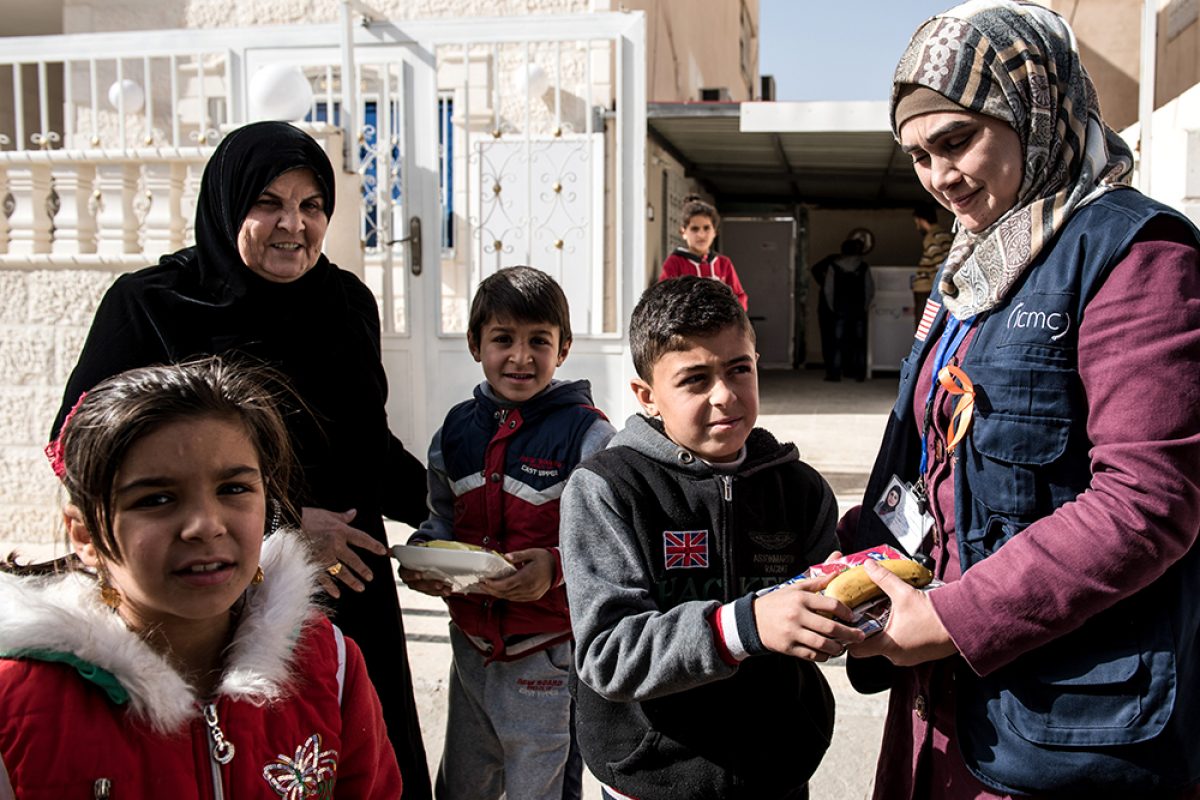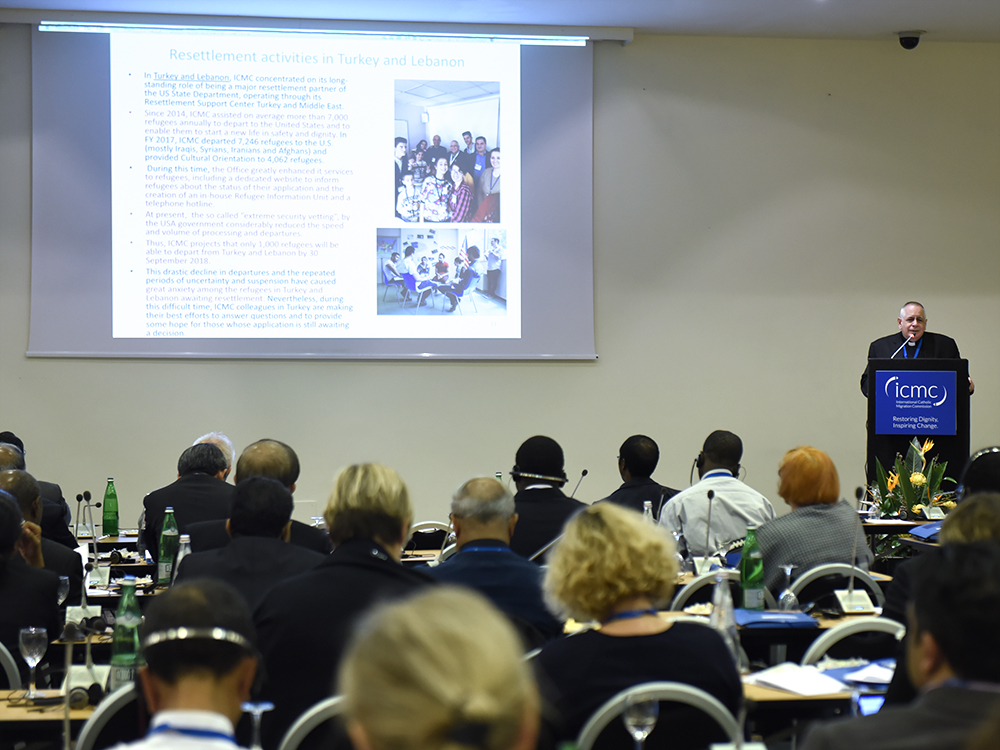ICMC Growing to Meet Challenges, Secretary General Reports

The International Catholic Migration Commission has significantly expanded its activities across the globe since 2014. ICMC’s current efforts and growing areas of expertise were the focus of Secretary-General Msgr. Robert J. Vitillo’s report to the ICMC Council, which met in Rome from 6-8 March 2018.
In response to the growing challenges and scale of forcible displacement, the number of beneficiaries supported by ICMC on an annual basis has grown to an estimated half a million people across Africa, the Middle East, Asia, Latin America and Europe.
Throughout these four years since the previous meeting of the ICMC Council, the field staff has more than doubled. Today, over 700 persons work in 11 field offices and ensure operational presence in over 40 countries. The figure includes volunteers and experts deployed to work with the UN Refugee Agency (UNHCR).
The main areas of ICMC expertise and activities include protection and prevention, humanitarian assistance, advocacy, refugee resettlement, migration and development, and Church networking.
Responding to needs in the field
Over the past year, ICMC assisted more than 140,000 people in Syria, mostly internally displaced, in and around Damascus. This figure includes nearly 30,000 Iraqi refugees and other nationalities. Another 81,000 Syrian refugees and close to 30,000 Jordanians in need of help were provided aid in Jordan.
Assistance includes pre-and post-natal care; cash-for-rent aid; community-level information systems; shelter; water, sanitation, and hygiene education; livelihood and protection.
With its two protection centers located in Jordan, ICMC also addresses the needs of particularly vulnerable groups, including women and girls, people with disabilities, the elderly, as well as survivors of trauma and gender-based violence.
In partnership with the Order of Friars Minor (Franciscan Fathers and Brothers), ICMC assisted some 250 families in the Aleppo area as well as Syrian families in Lebanon. They received food, heating fuel, and other essentials. This project also supports a partially-destroyed school by funding teachers’ salaries and student activities.
Syrian refugee children in Jordan, many of whom are out of school, are at significant risk of becoming a “lost generation.” ICMC has implemented a youth-specific project by which youth use photography to document and share their stories as teens in their communities.
In Turkey and Lebanon, ICMC has been a longstanding partner to the US State Department, operating its Resettlement Support Center. From 2014-2016, ICMC assisted on average more than 7,000 refugees annually to depart to the United States and start a new life in safety and in dignity.
Today, the new “extreme security vetting” by the US government has considerably reduced the speed and volume of processing and departures. ICMC estimates that much fewer refugees will be able to depart from Turkey and Lebanon by 30 September 2018.
Pakistan is still hosting over 1.3 million registered Afghan refugees after four decades of protracted displacement. ICMC enlarged its operations in the last four years, despite a very challenging environment for an international Catholic NGO – in 2017 alone, ICMC assisted more than 139,000 refugees.
In addition to health and humanitarian assistance, ICMC has been sponsoring a shelter for Afghan women and children who are victims of domestic and gender-based violence, and await resettlement to the US or other countries.
In Malaysia, ICMC continued to expand its services to Rohingya and other survivors of sexual and gender-based violence, including those from the Middle East and Africa. With a presence in Kuala Lumpur, Penang and enhanced cooperation with UNHCR for the referral of cases, ICMC assisted a total of 430 people during 2016 and 2017.
A special appeal to private donors was launched by ICMC to assist one of its members, Caritas Bangladesh, to respond to the urgent needs of Rohingya refugees crossing from Rakhine State in Myanmar to seek safety.
In 2017, ICMC deployed 153 experts as short-term auxiliary workers to 65 UNHCR duty stations in 44 countries. These experts interviewed and assisted more than 67,000 refugees in Africa, the Middle East, Asia, Latin America and Europe.
ICMC experts deployed in Greece were on the frontline when the number of arrivals by sea grew significantly. As a result of this, ICMC staff increased from 20 in 2014 to more than 160 by the end of 2017.
Advocacy and resettlement
ICMC’s presence in the field both through operations and through its members makes its advocacy more credible because of its proximity to those directly affected. Its efforts also bridge the gap between refugee and migrant protection, which States often tend to separate.

Together with the International Council of Voluntary Agencies and the UN NGO Committee on Migration, ICMC coordinated civil society advocacy leading up to the UN Summit on Mass Movements of Migrants and Refugees. More recently, ICMC has engaged in similar coordination for the two processes leading up to the Global Compacts for Safe, Orderly and Regular Migration and for Refugees.
During the past seven years, ICMC has coordinated the civil society contribution to the Global Forum on Migration and Development, an activity involving over 200 civil society organizations.
One of the outcomes of ICMC’s advocacy is the document “Now and How: Ten Acts for the Global Compact,” which reflects a civil society vision in the context of current negotiations of the Global Compact for Migration.
ICMC’s US Liaison office in Washington, D.C. works particularly on links to current US government-funded programs. ICMC staff advocate on behalf of vulnerable refugees with US government policymakers. A current focus of this work is anti-human trafficking initiatives.
ICMC has also worked intensively on improving local integration and welcoming of refugees in Europe. Since 2012 ICMC Europe and partners have developed and led the SHARE Network, a platform of approximately 1200 NGOs, local authorities, diaspora organizations, volunteers, parishes, universities, and more located in 28 European countries.
The SHARE network works to promote the protection and integration of refugees in Europe. In order to do so, it has developed and disseminated good practices in refugee reception, housing, volunteering and integration within the community. A new SHARE project started in February 2018 with partners in Austria, Belgium, France, Germany, Italy, the Netherlands, Portugal, Romania and the UK.
ICMC facilitates knowledge sharing on protection and resettlement for forcibly displaced persons in Europe. ICMC Europe currently implements a three-year Migration and Development program in cooperation with the Centre for Migration Studies of the University of Ghana, the African Foundation for Development, and the Forum des Organisations de Solidarité Internationale Issues des Migrations. ICMC will focus, in particular, on Senegal and Guinea to improve the capacity of civil society, protect migrant workers and prevent human trafficking.
Church networking and support
ICMC has a worldwide network of over 110 members – Catholic Bishops’ Conferences and specialized agencies – engaged in migration and refugee issues at the local and national level.
Members also engage in regional advocacy. The Asia-Oceania Working Group works on effective responses to unaccompanied child migrants, advocacy for labor migrants’ rights, and efforts to eradicate human trafficking. The Symposium of Episcopal Conferences of Africa and Madagascar and the ICMC Africa Working Group advocate with the African Union on the two UN Compacts.
In collaboration with the International Labor Organization and numerous Catholic-inspired organizations, ICMC is taking on a project to enable research, reflection and knowledge-sharing about challenges facing labor. Named after Pope Francis’ second encyclical, The Future of Work, Labor After Laudato Si’ seeks to bring together business associations, international movements, faith-based organizations and universities to address challenges such as lack of employment opportunities for youth and gender inequalities.
Funding for ICMC’s operational programs comes mainly from governments and institutional donors, including the US, the European Union (ECHO), UNHCR and Canada. ICMC members, other church partners, and private donors also provide critical support.
The protracted refugee crises in many parts of the world, difficult operational environments, and a rapidly changing geopolitical climate pose significant challenges for ICMC. Speaking to the ICMC Council on 8 March, Pope Francis expressed strong support for the organization’s work as “an integral part of the mission entrusted by God to the Church.”
Watch Msgr. Vitillo describe ICMC’s four years of growth